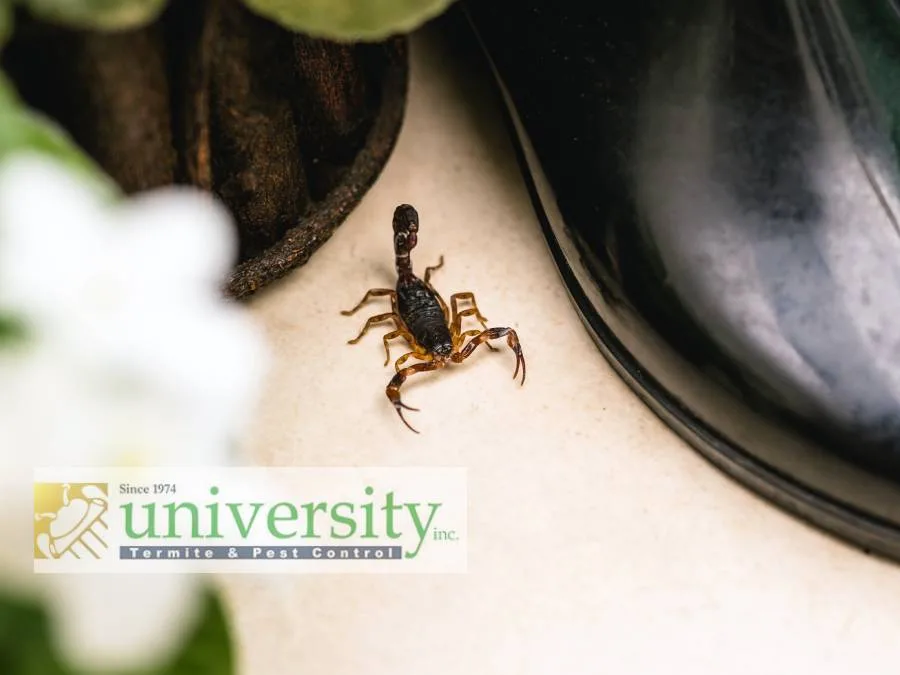Tucson is renowned for its breathtaking desert scenery and sunny weather but has one of the most unnerving challenges: scorpions. These resilient pests thrive in the desert climate and often invade yards and homes.
At University Termite & Pest Control, we\’ve spent over 50 years honing our expertise in helping Tucson residents manage and prevent scorpion infestations. With our deep understanding of scorpions and proven prevention strategies, we can help you protect your home and family. Let\’s explore why scorpions are a nuisance in Tucson and how to keep them at bay.
Why Are Scorpions So Common in Tucson?
Ideal Living Conditions: Tucson’s warm climate and arid desert terrain create the perfect scorpion environment. These nocturnal creatures seek out cool, dark spaces during the day and often find shelter in yards, under rocks, or even inside homes.
Common Scorpion Species in Tucson
- Bark Scorpion: The most dangerous and venomous species in Tucson. These agile climbers often find their way indoors.
- Striped Tail Scorpion: Less venomous but still capable of delivering painful stings.
- Desert Hairy Scorpion: The largest scorpion species in the area, though its sting is less harmful than the bark scorpion\’s.
Why They Invade Homes
Scorpions enter homes searching for food (insects), water, and shelter. At University Termite & Pest Control, we’ve found that poorly sealed entry points, cluttered yards, and leaky plumbing often attract scorpions into residential areas.
The Dangers of Scorpions
Painful and Potentially Dangerous Stings
Scorpion stings can cause a range of symptoms:
- Mild Symptoms: Pain, swelling, and redness.
- Severe Symptoms: Muscle twitching, difficulty breathing, or numbness—particularly from the bark scorpion.
Who’s Most at Risk?
Children, older people, and those with compromised immune systems are especially vulnerable to severe reactions from scorpion stings. Bark scorpions pose a significant health risk and may require immediate medical attention.
How to Spot Scorpion Activity in Your Home
Signs You Have Scorpions
- Frequent Sightings: If you frequently see scorpions indoors or outdoors, especially near entry points, you may have an infestation.
- Shredded Exoskeletons: Scorpions shed their outer layer as they grow, leaving behind tiny exoskeletons.
- Nocturnal Activity: Use a UV flashlight at night to detect scorpions, as they glow under black light.
Where Scorpions Hide
- Outdoors: Under rocks, woodpiles, and debris.
- Indoors: In cool, dark places like closets, shoes, or bathrooms.
How to Prevent Scorpions from Entering Your Home
Seal Off Entry Points
Scorpions can squeeze through gaps as small as 1/16th of an inch.
- Inspect Your Home: Check for cracks around windows, doors, and utility pipes.
- Use Caulk or Weatherstripping: Seal gaps in walls, doors, and windows.
- Install Door Sweeps: Prevent scorpions from crawling under doors.
Maintain a Clean Yard
- Remove piles of debris, rocks, and wood where scorpions can hide.
- Trim bushes and vegetation near your home’s foundation.
- Store firewood at least 20 feet from your house.
Eliminate Their Food Source
Since scorpions feed on insects, reducing their food supply is crucial.
- Use outdoor lighting sparingly, as it attracts insects.
- Schedule regular pest control services to eliminate crickets, roaches, and prey.
Year-Round Scorpion Prevention
Seasonal Maintenance
Scorpions are active year-round in Tucson, so continuous prevention is vital.
- Spring and Summer: Focus on outdoor inspections and yard maintenance.
- Fall and Winter: Seal indoor entry points as scorpions seek warmth.
Routine Pest Control
At University Termite & Pest Control, our year-round services include inspections, treatments, and preventative measures to keep your home scorpion-free. Regular visits ensure any vulnerabilities are addressed promptly.
Get Started with University Termite & Pest Control
Scorpions are a real pain in Tucson but don\’t have to be a permanent problem. You can protect your home and family by sealing entry points, maintaining a clean environment, and partnering with a University Termite & Pest Control. Contact us today to schedule your free inspection.


